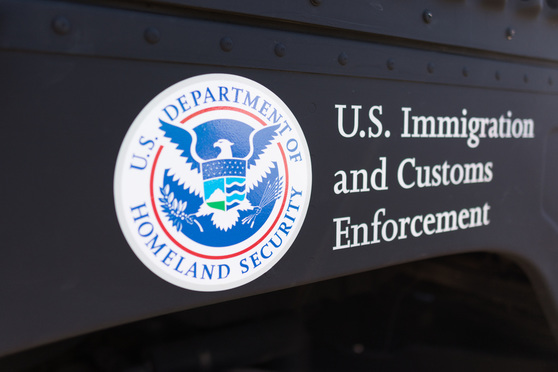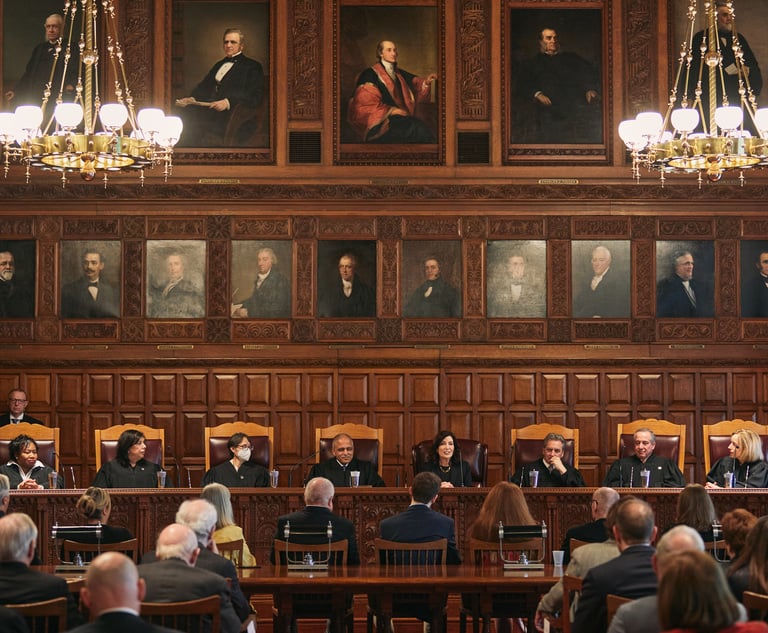Uncertain Times Have Boosted Pro Bono
Much attention to pro bono lawyering has focused on the border, but there has been a sustained effort defending the rights of immigrants for longer than that.
August 14, 2018 at 03:11 PM
4 minute read

For New York law firms there has always been considerable risk in naming the current occupant of the White House, whoever it happens to be, and I don't plan to name the latest one here, either.
Still, over the last couple of years at New York Lawyers for the Public Interest, we've seen a marked rededication to the pursuit of justice through pro bono engagement from our partner attorneys, particularly in the area of immigration. And I don't think that's coincidental.
Believe me, to use an increasingly familiar turn of phrase, it's been…huge. And it's not hard to see why: Recent headlines about family separation may have prompted one protester to scale the Statue of Liberty, but the steady drip of immigration horror stories began long before that.
The 2017 death of Carlos Mejia-Bonilla while in the custody of Immigration and Customs Enforcement (ICE) followed repeated requests for proper medical care. He told his family that he wasn't receiving the care he desperately needed. Sadly, he was right. NYLPI, in partnership with pro bono counsel at Dechert, is preparing to file a lawsuit on behalf of Mr. Bonilla's daughter.
It's worth noting that while the immigration attitude, policy and rhetoric of America's federal leadership has taken a marked turn for the worse since the administration changed in 2017, human beings in ICE detention have experienced routinely dangerous conditions for longer than that, including delays in receiving medical attention, denial of requests for off-site specialized care and inadequate treatment for acute pain.
Much attention to pro bono lawyering has focused on the border, but there has been a sustained effort defending the rights of immigrants for longer than that. We continue to litigate with our pro bono partners at Simpson Thacher & Bartlett in the case of Michelet Charles, for example. A green card holder who relies on daily medication to treat bipolar and schizoaffective disorders, Mr. Charles was abandoned on the street in Manhattan during freezing weather after winning his immigration hearing, in early 2016. Shortly after his release, Mr. Charles required a two-month admission to an inpatient psychiatric facility when beforehand, he had successfully managed his mental health for years.
Yet there is no denying that we are living, now, in darker times. A marked and terrifying increase in aggressive ICE action has caused nonprofits and service providers alike to question how to continue effective operations and ensure that their immigrant clients have access to their services.
The long battle for civil rights and social justice has entered a startling era of uncertainty, and in the midst of that, lawyers have increasingly felt the rising sense of justice denied that draws so many of us to practice in the modern profession, in the first place.
The significant increase in immigration arrests—including in and around courts, public buildings, places of worship and schools—has caused feelings of panic in immigrant communities. Many of our own clients have expressed fear of going to court and to health care providers to receive life-saving medical care because of the perceived dangers of immigration enforcement.
In response, with help from our pro bono partners at firms including Stroock & Stroock & Lavan, we developed guidelines to help nonprofits protect themselves and their clients in the face of increased immigration enforcement. The guide, produced in partnership with expert attorneys, nonprofits and social service leaders, has helped those working in the immigration space to navigate complex and frightening questions in this area.
Naturalization is also key for many immigrants in overcoming a host of obstacles and, of course, it means that they can hold our leaders accountable by voting. Our pro bono partners at Simpson Thacher, at Fried, Frank, Harris, Shriver & Jacobson and at Cleary Gottlieb Steen & Hamilton have helped to naturalize approaching a thousand people since 2016.
Of course, pro bono attorneys have always been an invaluable part of New York's legal landscape. But there is no doubt that right now, we are in the midst of an ongoing and extraordinary call-to-arms. Based on the evidence, it's only a matter of time before the next opportunity for impactful engagement arises.
Marnie Berk is the director of pro bono programs at New York Lawyers for the Public Interest (NYLPI.org).
This content has been archived. It is available through our partners, LexisNexis® and Bloomberg Law.
To view this content, please continue to their sites.
Not a Lexis Subscriber?
Subscribe Now
Not a Bloomberg Law Subscriber?
Subscribe Now
NOT FOR REPRINT
© 2025 ALM Global, LLC, All Rights Reserved. Request academic re-use from www.copyright.com. All other uses, submit a request to [email protected]. For more information visit Asset & Logo Licensing.
You Might Like
View All
Jimmy Carter’s 1974 Law Day Speech: A Call for Lawyers to Do the Public Good
14 minute readTrending Stories
Who Got The Work
Michael G. Bongiorno, Andrew Scott Dulberg and Elizabeth E. Driscoll from Wilmer Cutler Pickering Hale and Dorr have stepped in to represent Symbotic Inc., an A.I.-enabled technology platform that focuses on increasing supply chain efficiency, and other defendants in a pending shareholder derivative lawsuit. The case, filed Oct. 2 in Massachusetts District Court by the Brown Law Firm on behalf of Stephen Austen, accuses certain officers and directors of misleading investors in regard to Symbotic's potential for margin growth by failing to disclose that the company was not equipped to timely deploy its systems or manage expenses through project delays. The case, assigned to U.S. District Judge Nathaniel M. Gorton, is 1:24-cv-12522, Austen v. Cohen et al.
Who Got The Work
Edmund Polubinski and Marie Killmond of Davis Polk & Wardwell have entered appearances for data platform software development company MongoDB and other defendants in a pending shareholder derivative lawsuit. The action, filed Oct. 7 in New York Southern District Court by the Brown Law Firm, accuses the company's directors and/or officers of falsely expressing confidence in the company’s restructuring of its sales incentive plan and downplaying the severity of decreases in its upfront commitments. The case is 1:24-cv-07594, Roy v. Ittycheria et al.
Who Got The Work
Amy O. Bruchs and Kurt F. Ellison of Michael Best & Friedrich have entered appearances for Epic Systems Corp. in a pending employment discrimination lawsuit. The suit was filed Sept. 7 in Wisconsin Western District Court by Levine Eisberner LLC and Siri & Glimstad on behalf of a project manager who claims that he was wrongfully terminated after applying for a religious exemption to the defendant's COVID-19 vaccine mandate. The case, assigned to U.S. Magistrate Judge Anita Marie Boor, is 3:24-cv-00630, Secker, Nathan v. Epic Systems Corporation.
Who Got The Work
David X. Sullivan, Thomas J. Finn and Gregory A. Hall from McCarter & English have entered appearances for Sunrun Installation Services in a pending civil rights lawsuit. The complaint was filed Sept. 4 in Connecticut District Court by attorney Robert M. Berke on behalf of former employee George Edward Steins, who was arrested and charged with employing an unregistered home improvement salesperson. The complaint alleges that had Sunrun informed the Connecticut Department of Consumer Protection that the plaintiff's employment had ended in 2017 and that he no longer held Sunrun's home improvement contractor license, he would not have been hit with charges, which were dismissed in May 2024. The case, assigned to U.S. District Judge Jeffrey A. Meyer, is 3:24-cv-01423, Steins v. Sunrun, Inc. et al.
Who Got The Work
Greenberg Traurig shareholder Joshua L. Raskin has entered an appearance for boohoo.com UK Ltd. in a pending patent infringement lawsuit. The suit, filed Sept. 3 in Texas Eastern District Court by Rozier Hardt McDonough on behalf of Alto Dynamics, asserts five patents related to an online shopping platform. The case, assigned to U.S. District Judge Rodney Gilstrap, is 2:24-cv-00719, Alto Dynamics, LLC v. boohoo.com UK Limited.
Featured Firms
Law Offices of Gary Martin Hays & Associates, P.C.
(470) 294-1674
Law Offices of Mark E. Salomone
(857) 444-6468
Smith & Hassler
(713) 739-1250









